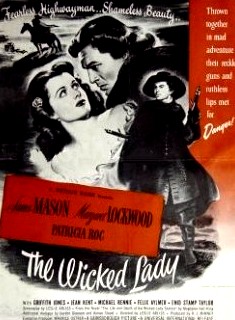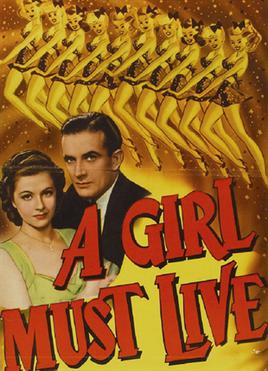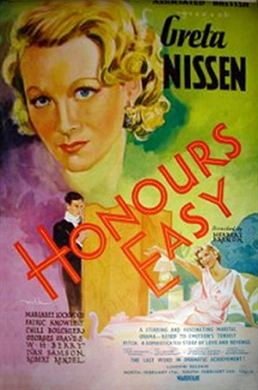
James Neville Mason was an English actor. He achieved considerable success in British cinema before becoming a star in Hollywood. He was the top box-office attraction in the UK in 1944 and 1945; his British films included The Seventh Veil (1945) and The Wicked Lady (1945). He starred in Odd Man Out (1947), the first recipient of the BAFTA Award for Best British Film.

Michael Rennie was a British film, television and stage actor, who had leading roles in a number of Hollywood films, including his portrayal of the space visitor Klaatu in the science fiction film The Day the Earth Stood Still (1951). In a career spanning more than 30 years, Rennie appeared in more than 50 films and in several American television series.

Margaret Mary Day Lockwood, CBE, was an English actress. One of Britain's most popular film stars of the 1930s and 1940s, her film appearances included The Lady Vanishes (1938), Night Train to Munich (1940), The Man in Grey (1943), and The Wicked Lady (1945). She was nominated for the BAFTA Award for Best British Actress for the 1955 film Cast a Dark Shadow. She also starred in the television series Justice (1971–74).

The Wicked Lady is a 1945 British costume drama film directed by Leslie Arliss and starring Margaret Lockwood in the title role as a nobleman's wife who becomes a highwaywoman for the excitement. The film had one of the largest audiences for a film of its period, 18.4 million.

Rodney Ackland was an English playwright, actor, theatre director and screenwriter.

Raymond Lovell was a Canadian actor who performed in British films. He mainly played supporting roles, often somewhat pompous characters.

The Man in Grey is a 1943 British film melodrama made by Gainsborough Pictures; it is considered to be the first of a series of period costume dramas now known as the "Gainsborough melodramas". It was directed by Leslie Arliss and produced by Edward Black from a screenplay by Arliss and Margaret Kennedy that was adapted by Doreen Montgomery from the 1941 novel The Man in Grey by Eleanor Smith. The film's sets were designed by Walter Murton.
Arthur Crabtree was a British cinematographer and film director. He directed films with comedians such as Will Hay, the Crazy Gang and Arthur Askey and several of the Gainsborough Melodramas.

A Place of One's Own is a 1945 British film directed by Bernard Knowles. An atmospheric ghost story based on the 1940 novel of the same title by Osbert Sitwell, it stars James Mason, Barbara Mullen, Margaret Lockwood, Dennis Price and Dulcie Gray. Mason and Mullen are artificially aged to play the old couple. It was one of the cycle of Gainsborough Melodramas.
Leslie Arliss was an English screenwriter and director. He is best known for his work on the Gainsborough melodramas directing films such as The Man in Grey and The Wicked Lady during the 1940s.
Charles Joel Saunders was an English film director and screenwriter who began in the industry as a film editor, and who also contributed to television. He was the brother of the theatrical producer Sir Peter Saunders.
Edward Black was a British film producer, best known for being head of production at Gainsborough Studios in the late 1930s and early 1940s, during which time he oversaw production of the Gainsborough melodramas. He also produced such classic films as The Lady Vanishes (1938). Black has been called "one of the unsung heroes of the British film industry" and "one of the greatest figures in British film history, the maker of stars like Margaret Lockwood, James Mason, John Mills and Stewart Granger. He was also one of the very few producers whose films, over a considerable period, made money." In 1946 Mason called Black "the one good production executive" that J. Arthur Rank had. Frank Launder called Black "a great showman and yet he had a great feeling for scripts and spent more time on them than anyone I have ever known. His experimental films used to come off as successful as his others."

Once Upon a Dream is a 1949 British comedy romance film directed by Ralph Thomas in his debut and starring Googie Withers, Griffith Jones, and Guy Middleton. It was a J. Arthur Rank presentation and a Sydney Box production, and was released through General Film Distributors Ltd. The film was made at the Lime Grove Studios with sets designed by the art director Cedric Dawe.

Owd Bob is a 1938 British drama film directed by Robert Stevenson. It stars Will Fyffe and John Loder. The film was released as To the Victor in the United States. It was based on the 1898 novel Owd Bob, previously filmed in 1924.

A Girl Must Live is a 1939 British romantic comedy film directed by Carol Reed that stars Margaret Lockwood, Renee Houston, Lilli Palmer, Hugh Sinclair, and Naunton Wayne. Based on a 1936 novel by Emery Bonett with the same title, the plot features three chorus line girls competing for the affection of a wealthy bachelor.

The Case of Gabriel Perry is a 1935 British crime film directed by Albert de Courville and starring Henry Oscar, Olga Lindo and Margaret Lockwood.

Honours Easy is a 1935 British drama film directed by Herbert Brenon and starring Greta Nissen, Patric Knowles and Margaret Lockwood. It follows a man who tries to take revenge on a rival for a slight seventeen years before by framing his son for theft. It was based on the play Honours Easy by Roland Pertwee.

Madness of the Heart is a 1949 British drama film directed by Charles Bennett, produced by Richard Wainwright for Two Cities Films and starring Margaret Lockwood, Paul Dupuis and Kathleen Byron. The screenplay was written by Charles Bennett, adapted from the novel of the same name by Flora Sandström.
Someday is a 1935 British romance film, directed by Michael Powell and starring Esmond Knight and Margaret Lockwood. The screenplay was adapted from a novel by I. A. R. Wylie.

The Alibi is a 1937 French mystery film directed by Pierre Chenal and starring Erich von Stroheim, Albert Préjean and Jany Holt. It has been described as a precursor to film noir.















